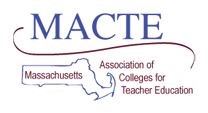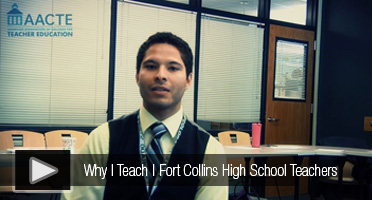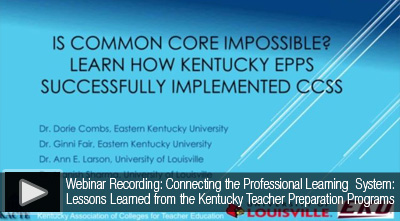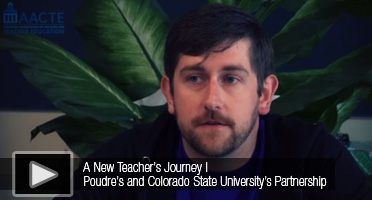11 Jan2016
By Jerrica Thurman
To discuss Nevada’s persistent teacher shortages and what local educator preparation providers (EPPs) are doing about it, AACTE will partner with member institutions for a press conference in advance of the 68th AACTE Annual Meeting. The event will be held Monday, February 22, at 2:00 p.m. PST on the campus of the University of Nevada, Las Vegas.
Severe staffing shortages in Clark County, Nevada’s largest school district, have been making national headlines and spurring emergency policy changes to boost numbers in the local teaching workforce. The press conference will address how the state’s EPPs, and those in similar contexts around the country, are addressing the crisis.
Officials from Clark County School District, nearby university-based colleges of education, and AACTE will discuss factors contributing to the local shortage as well as efforts to alleviate it. The following panelists have been confirmed to date:
- Staci Vesneske, Former Chief Human Resources Officer, Clark County School District, on special assignment to the superintendent’s office
- Kim Metcalf, Dean, College of Education, University of Nevada, Las Vegas
- Kenneth Coll, Dean, College of Education, University of Nevada, Reno
- Dennis Potthoff, Dean, School of Education, Nevada State College
- Thomas Reagan, Dean of Arts and Sciences, Great Basin College
- Mark LaCelle-Peterson, AACTE Senior Vice President for Policy and Programs
05 Jan2016
By Deborah Koolbeck
On December 21 and 22, the U.S. Department of Education held webinars on the new Every Student Succeeds Act (ESSA), the law that reauthorized the Elementary and Secondary Education Act (ESEA). Click here to access slides from the webinars, which included some timelines and initial information about the transition from the framework of the No Child Left Behind Act to the new framework of ESSA.
I recommend that you review the Department’s slides to support and enhance your program’s partnerships by giving you a sense of what your state education leaders and PK-12 partners will be experiencing over the coming months and year(s). In particular, consider the implications of ending the waivers (referred to in the webinar as ESEA flexibility or ESEA waivers) as of August 1 of this year.
04 Jan2016
By Sharon Robinson
On December 10, after many painful years of wrestling with the heavy-handed No Child Left Behind Act and state waivers that were often more prescriptive than the law itself, educators finally got a new federal law governing PK-12 education. Its replacement, the Every Student Succeeds Act (ESSA), promises to return power to the states, reduce accountability burdens, and broaden the scope of support for students with the greatest needs. I join my fellow educators around the country in celebrating these improvements.
Nonetheless, there are lemons lurking among the plums in the new ESSA. This law contains more concessions to reformist entrepreneurs and venture philanthropists than many of us would like. For example, one provision in Title II allows states to create charter-like “academies” for preparing teachers and principals for high-need schools—an idea that has been debated for several years and widely opposed by education organizations. Now that it is part of the law, however, we will do well to heed Maya Angelou’s advice: if you can’t change it, change the way you think about it. So let’s celebrate the plums and then get busy making lemonade.
21 Dec2015
By Deborah Koolbeck
On December 17, Senator Jack Reed (D-RI) with original cosponsor Senator Bob Casey (D-PA) reintroduced the Educator Preparation Reform Act (EPRA). In addition, we expect that Representative Mike Honda (D-CA) will reintroduce EPRA in the U.S. House of Representatives early next year. We appreciate the continued support from both Senator Reed and Representative Honda on strengthening teacher preparation programs in the Higher Education Act (HEA), and we are pleased to see Senator Casey supporting EPRA on introduction as well this congress.
15 Dec2015
By Kathleen McNamara

Political advocacy was the focus of much work this fall for the Massachusetts Association of Colleges for Teacher Education (MACTE). The national attention to teacher preparation policy, from the reauthorization of the Elementary and Secondary Education Act to the proposed teacher preparation program regulations, inspired our state chapter to respond in a big way. We were—and are—determined to tell our story.
As a first step, the MACTE Executive Board created a “take home document” to educate our elected officials, highlighting some of the current work of member institutions. We pointed out initiatives and programs that were specifically developed to meet the greatest needs of our PK-12 partners and, ultimately, the needs of the students in the commonwealth. To compile this document, we put a call out to all of our member institutions to tell us what they were doing across five main focus areas:
01 Dec2015
By Guneev Sharma
To help you tell your story, AACTE is hosting a three-part webinar series this fall titled “If You Don’t Say It, Who Will?” which offers strategies for how to engage your internal networks and PK-12 partners as well as how to be sure the media and other audiences hear your messages. Won’t you join us in our ongoing campaign to debunk myths about educator preparation and teacher quality?
The first webinar in the series ran November 16, as dozens of you tuned in for “If You Don’t Say It, Who Will? Engaging Internal Networks to Tell Your Story” led by AACTE Director of Marketing and Communications Jerrica Thurman. This event taught participants how to create engagement and communication within their institutions to build a stronger channel for promoting the meaningful work happening in their educator preparation programs. Thurman also shared strategies for recruiting students, faculty, communication officers, and others to spread the word about the impact their program is making. In addition to discussing how to develop dynamic key messages and to identify news worthy to share, Thurman walked participants through the steps to develop a successful communications strategy:
17 Nov2015
By Laurie A. Henry and Cindy Diehl Yang
The AACTE Clinical Practice Commission (CPC) has been working over the last 6 months to examine the state of clinical practice in educator preparation. With a charge to develop a white paper that provides a common understanding of effective approaches to field experiences and clinical practice, members of the CPC met for a 2-day working session in Washington, DC, in August.
Members of the commission, who represent institutions of higher education, PK-12 school districts, and professional associations, formed workgroups around the core topics that will provide a foundational structure for the white paper: literature review, foundations of theory, foundations of practice, lexicon, and current context and policy background.
17 Nov2015
By Christine DeGregory

If you have been inspired by the previous Research-to-Practice Spotlight videos featuring the robust partnership between Colorado State University (CSU) and the Poudre School District (PSD) in Fort Collins, don’t miss the final mini-installment in the series, in which various teachers at Fort Collins High School share their passion for teaching. Below, Christine DeGregory reflects on what she witnessed during her visit with the partners last spring.
I’m a firm believer in the power of clinical practice—particularly clinical practice supported by a professional development school model. I had heard many wonderful things about the special partnership that Colorado State University (CSU) had nurtured with the Poudre School District (PSD), but having the opportunity to talk to partnership members and see their work in action reaffirmed to me that some common approaches to clinical practice can be successfully reimagined.
05 Nov2015
By Sharon Robinson

As the Common Core State Standards (CCSS) and their kindred iterations continue to gain traction in schools around the country, staff development efforts have been bringing in-service educators up to speed, and colleges of education have been adjusting their curricula to ensure that the field’s newest professionals are also ready for the new standards. Nowhere has this shift seen greater success than in Kentucky, which was the first state to adopt and implement CCSS. A recent AACTE webinar sponsored by the Learning First Alliance’s “Get It Right” campaign highlighted the remarkable progress made by institutions in the state.
03 Nov2015
By Christine DeGregory
 If you have been inspired by the previous Research-to-Practice Spotlight videos featuring the robust partnership between Colorado State University (CSU) and the Poudre School District (PSD) in Fort Collins, don’t miss the newest installment in the series, in which school and university officials share advice on how to implement a successful clinical practice model.
If you have been inspired by the previous Research-to-Practice Spotlight videos featuring the robust partnership between Colorado State University (CSU) and the Poudre School District (PSD) in Fort Collins, don’t miss the newest installment in the series, in which school and university officials share advice on how to implement a successful clinical practice model.
Utilizing a professional development school approach, CSU and PSD have created an intentional, collaborative endeavor to achieve their shared mission of preparing highly qualified and effective teachers.
03 Nov2015
By Susan Korach
While the impact of partnerships is not yet fully understood, there is a growing body of evidence that suggests that school districts that partner with local principal training providers are more likely to leverage programmatic changes that result in principals who are better equipped to lead schools to improve student performance.
— Cheryl King, Quality Measures: Partnership Effectiveness Continuum (2014)
Last month, I had the privilege of joining colleagues from around the country to present an AACTE webinar about building school-university partnerships to support stronger preparation of school leaders. A recording of the webinar is now available here.
03 Nov2015
By Jerrica Thurman

Ed Prep Matters is featuring “Stories of Impact” to showcase AACTE member institutions with educator preparation programs that are making a positive impact in their communities and beyond through innovative practices. We are committed to sharing members’ success stories and encourage you to do the same.
Schools of education across the country take a variety of innovative approaches to improving the preparation of teachers in partnership with local schools. One example that recently won the attention of a local news channel is a lab school of Butler University (IN), which is part of the state’s largest school district, Indianapolis Public Schools (IPS). Providing its elementary students a unique opportunity to guide their own learning, this school is centered on the Reggio Emilia approach—a project-based style of teaching and learning designed to build students’ critical thinking and democratic ideas.
30 Oct2015
By Roxanne Pickle
The sixth annual edTPA Minnesota Summit, held October 7 at St. Cloud State University, focused on an issue that is essential to high-quality, comprehensive teacher preparation: securing and maintaining partnerships among higher education institutions and PK-12 school districts.
The summit brought together nearly 100 Minnesota educators to discuss strategies and best practices for creating strong bonds between educator preparation programs and the schools that will host and hire their students.
20 Oct2015
By Arlinda J. Eaton
Meaningful and purposeful collaboration among multiple agency heads is something that many states aspire to do. Georgia is among those that have been successful in forming such alliances, which provides a supportive environment for the work of the Georgia Association of Colleges for Teacher Education (GACTE).
The collaborative culture is well established in the Georgia Alliance of Education Agency Heads, which over the past decade has been successfully fulfilling its mission to collaborate, innovate, and achieve while addressing three strategic goals: (1) increase the percentage of students reading at grade level by completion of third grade; (2) increase the percentage of graduates from high school and postsecondary institutions prepared for the demands of college, workplace, a global economy, and responsible citizenship; and (3) increase the percentage of effective teachers and educational leaders. The alliance includes the state’s universities and technical colleges, the governor’s office, the Georgia Professional Standards Commission, and other education agencies.
06 Oct2015
By Michelle Kotek

A new video in AACTE’s Research-to-Practice Spotlight Series focuses on a thriving partnership in Colorado from the perspectives of novice teachers prepared in a professional development school model. This blog highlights one teacher’s experience and offers insights from his assistant principal about the program’s success.
The forward-thinking partnership between Colorado State University (CSU) and the local Poudre School District employs a professional development school (PDS) model to prepare teachers who are ready to teach on Day 1. Their classroom is the classroom: Instead of taking their classes off site at the university, prospective teachers receive their lessons and then put them into practice in the same school building—with real kids and under the tutelage of a real teacher. While the program’s elements are fairly typical, its particular success comes from each course’s clinical component and support from a robust professional community.












